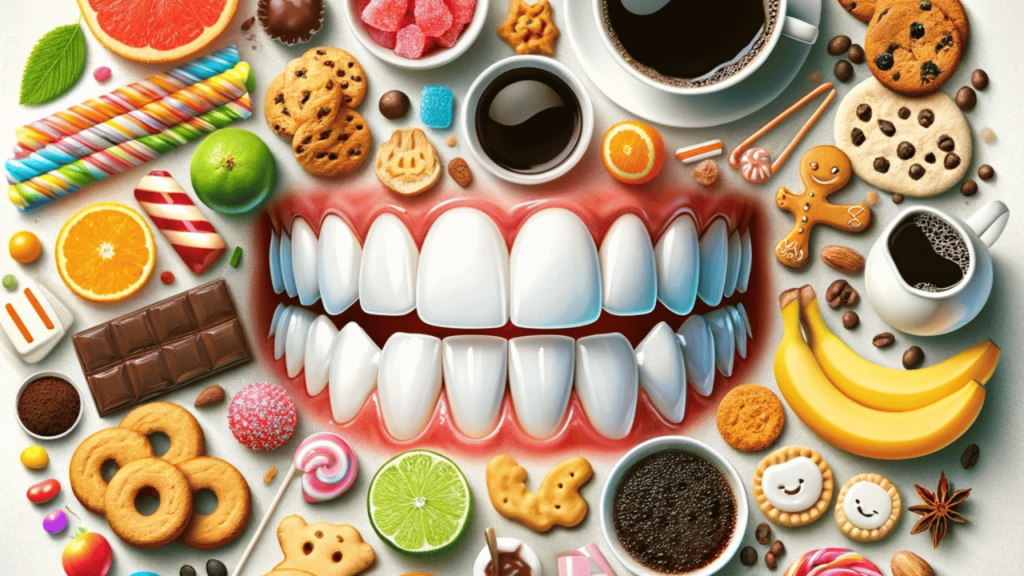Introduction: The Journey to a Brighter Smile
In our visually-driven world, a bright, white smile is more than just an aesthetic choice; it symbolizes health, youth, and confidence. Teeth whitening, as a cosmetic dental procedure, has gained immense popularity, thanks to its ability to transform and enhance smiles. With today’s advancements, achieving that picture-perfect smile is both accessible and efficient.
However, the path to maintaining that flawless smile extends beyond the whitening procedure. Post-whitening care plays a pivotal role in preserving the treatment’s effectiveness. A significant part of this care revolves around your diet. Being mindful of what not to eat after teeth whitening is crucial for sustaining those sparkling results. In the sections that follow, we’ll explore the dietary dos and don’ts after a teeth whitening session, ensuring your smile continues to shine brilliantly.
Understanding Teeth Whitening
Teeth whitening isn’t just a surface-level change; it’s a deep-cleaning process for your teeth. This popular procedure typically involves bleaching agents, like hydrogen peroxide or carbamide peroxide. These agents work by breaking down the stains that dull your smile, effectively restoring the natural whiteness of your teeth. Whether you have this done professionally at Smile Studio Boston or opt for a home kit, the goal is the same: a brighter, more vibrant smile.
After you’ve achieved that gleaming smile, it’s vital to understand how your diet can impact the results. Post-whitening, your teeth are more porous and sensitive to staining. This makes them like sponges, quickly absorbing the colors of foods and drinks. Also, acidic foods can weaken your enamel, making your teeth more prone to staining. That’s why knowing what not to eat after teeth whitening is key to maintaining those dazzling results. The right diet choices in the days following your treatment can significantly extend the life of your whitened teeth.
Foods to Eat After Teeth Whitening
Navigating your diet post-teeth whitening is crucial for maintaining that brilliant smile. While it’s key to know what not to eat after teeth whitening, it’s equally important to understand which foods are beneficial. Here’s a guide to teeth-friendly foods:
After whitening, your teeth might be a bit sensitive. Plain yogurt is an excellent choice during this time. Its smooth, creamy texture is gentle on sensitive teeth, and its high calcium content helps strengthen your enamel, promoting oral health.
Incorporate soft, less acidic fruits like strawberries and watermelon into your post-whitening diet. These fruits are kind to sensitive teeth and are less likely to cause staining. Plus, strawberries come with an added benefit – they’re a natural enamel brightener thanks to their malic acid content.
Turn to comfort foods like eggs, mashed potatoes, and soft grains such as oatmeal. These foods are easy on your teeth, nonabrasive, and low in staining risks. Eggs provide a good dose of vitamin D, while grains support gum health.
Hydration plays a crucial role in maintaining oral health post-whitening. Drinking plenty of water helps rinse away potential staining substances and keeps your mouth clean. Milk is another great choice – it’s rich in calcium and gentle on your teeth, helping preserve the whitening effect.
By choosing these foods and drinks, you’re not only supporting the longevity of your teeth whitening results but also contributing to your overall dental health. Remember, a balanced diet is key to keeping that smile shining bright.
What Not to Eat After Teeth Whitening?
Post-whitening, your diet plays a crucial role in maintaining those pearly whites. Let’s delve into what not to eat after teeth whitening to ensure your smile stays bright and beautiful.
Beware of Acidic Foods
Post-whitening, your teeth are particularly vulnerable to acidic foods. These include citrus fruits, tomatoes, and vinegar-based items like pickles. Acidic foods can soften and erode tooth enamel, increasing the risk of staining and sensitivity. Protect your teeth by limiting these enamel-weakening foods.
Say No to Sugary Temptations
Sugary foods and beverages are a no-go after whitening. This category encompasses candy, cookies, ice cream, sugary cereals, fruit juices and energy drinks. High sugar content can weaken tooth enamel, leading to decay and staining – the enemies of your newly whitened teeth.
Avoid Dark-Colored Beverages
Dark pigments in beverages like coffee, tea, and red wine can quickly undo your whitening efforts. These drinks are rich in staining agents that latch onto tooth enamel, especially when it’s freshly whitened and more porous. To keep your smile sparkling, it’s best to minimize or avoid these staining liquids.
Hard, Crunchy, and Sticky Foods: A Caution
Finally, steer clear of hard, crunchy, and sticky foods. Hard foods can chip or damage enamel, while sticky foods tend to adhere to teeth, leading to decay and potential staining. Avoid nuts, hard candies, chips, and popcorn to maintain the integrity of your whitened teeth.
Keeping these dietary guidelines in mind will help prolong the life of your teeth whitening treatment. Remember, the key to maintaining that dazzling smile lies in the care you take post-procedure, particularly with your diet.

Maintaining Your White Smile
Achieving a whiter smile is just the beginning. Keeping your teeth shining after a whitening treatment is not just about what not to eat after teeth whitening; it’s also about adopting a comprehensive care routine. Let’s dive into the best practices to maintain that sparkling smile.
Commit to Oral Hygiene
Good oral hygiene is your first defense in preserving that bright smile. Brushing and flossing regularly are vital to remove plaque and avoid stains. Incorporate whitening toothpaste or mouthwash into your routine. These products are designed to tackle surface stains and help prevent new ones, ensuring your whitening results last longer and your smile stays brighter.
Mindful Eating and Drinking
Your eating and drinking habits have a direct impact on your whitened teeth. Be cautious about consuming foods and drinks that are notorious for staining. Using a straw can significantly reduce their contact with your teeth when indulging in darker beverages like coffee or red wine, minimizing staining. Also, make it a habit to drink water after meals. This simple practice can wash away potential staining elements, keeping your teeth clean and white.
Don’t Skip Dental Visits
Regular dental check-ups are not just for routine cleanings; they’re an essential part of maintaining your whitening results. These visits allow your dentist to monitor your whitening progress and maintain oral health. Consistent dental check-ups help catch any issues early and ensure your smile remains healthy and bright post-whitening.
By following these key steps, you can significantly extend the lifespan of your teeth whitening treatment. A blend of diligent oral hygiene, wise dietary choices, and regular dental care is the ultimate recipe for keeping your smile dazzling long after your whitening session.
Keeping Your Smile Bright
Maintaining your newly whitened smile is straightforward with the right approach. Focus on two key areas: your diet and oral hygiene. Avoid foods and drinks that can stain or harm your teeth, like acidic or sugary items and dark-colored beverages. Instead, choose tooth-friendly foods and stay hydrated.
Regular brushing, flossing, and the use of whitening toothpaste or mouthwash are essential to keep your teeth shining. These daily practices are crucial in preserving the results of your whitening treatment.
For ongoing support and care, Smile Studio Boston is your go-to for professional teeth whitening services and personalized dental advice. Regular check-ups with your dentist are important to maintain the health and appearance of your smile.
For Appointment please fill out this form. For more assistance, contact us here.
Adopt these habits to ensure your bright smile stays vibrant and healthy long-term.
FAQs
1. What foods should be avoided after teeth whitening?
– After teeth whitening, it’s recommended to avoid acidic foods, sugary foods and beverages, dark-colored beverages (like coffee, tea, and red wine), and hard, crunchy, or sticky foods. These can damage tooth enamel, increase sensitivity, and cause staining.
2. How does diet impact teeth after whitening?
– Diet plays a crucial role post-whitening. Foods with strong pigments, high acidity, or sugar content can stain or weaken the enamel of newly whitened teeth. Choosing the right foods and drinks can help maintain the whitening results for a longer period.
3. What are the best oral hygiene practices after teeth whitening?
– The best oral hygiene practices after teeth whitening include regular brushing and flossing, using a whitening toothpaste or mouthwash, and avoiding foods and drinks that can stain your teeth. This helps maintain the results of the whitening treatment and overall oral health.
4. Why are regular dental check-ups important after teeth whitening?
– Regular dental check-ups are important after teeth whitening because they allow the dentist to monitor the health of your teeth and the longevity of the whitening results. They can also provide professional care and address any issues early on, ensuring lasting oral health.
5. Can I drink coffee after teeth whitening?
– It’s best to avoid coffee immediately after teeth whitening as it can stain the teeth. If you do consume coffee, try using a straw to minimize contact with your teeth, and rinse your mouth with water afterwards to reduce the risk of staining.


